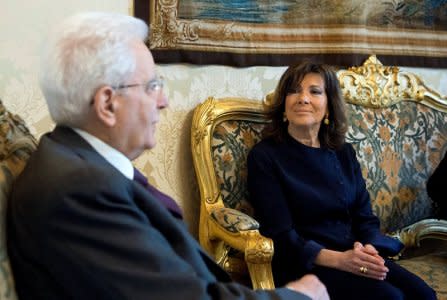Italy Senate chief gets mission (almost) impossible to form government

Thomson Reuters
By Gavin Jones
ROME (Reuters) - Italian President Sergio Mattarella on Wednesday asked the head of the upper house Senate to meet bickering party leaders to see if she can break the deadlock following inconclusive elections six weeks ago.
The European Union's third-largest economy has been under a caretaker government since the March 4 polls, when anti-establishment and far-right parties were the big winners at the expense of more mainstream groups.
Mattarella told Senate chief Maria Casellati to explore the scope for a deal between a conservative alliance which won most seats at the election, and the anti-system 5-Star Movement which emerged as the largest single party.
He told her to report back to him on Friday, and her task looks almost impossible.
5-Star said earlier on Wednesday it would definitely not join any coalition that included former Prime Minister Silvio Berlusconi's Forza Italia (Go Italy!) party, which is a core component of the rightist bloc.
Casellati, 71, is a senior member of Forza Italia and is close to Berlusconi.
5-Star, which bases its appeal on a promise to clean up politics, refuses to countenance a deal with the 81-year-old media billionaire who has a conviction for tax fraud and is on trial for bribing witnesses - a charge he denies.
"We will tell Casellati the same things we told Mattarella. The veto on Berlusconi will remain because Berlusconi and Forza Italia represent the status quo and we want to change things," said Vito Crimi, a prominent 5-Star senator.
Mattarella turned to Casellati after holding two rounds of consultations with parties himself, which floundered against a series of vetoes and seemingly irreconcilable demands.
The conservative bloc, made up of the far-right, eurosceptic League, the much smaller nationalist Brothers of Italy party and the more moderate Forza Italia, fell less than 60 seats short of an absolute majority in the Chamber of Deputies.
5-Star has said it is willing to govern with the League, and the two parties could muster a majority, but League leader Matteo Salvini has refused to abandon his ally Berlusconi.
ROLE FOR PD?
The stalemate is likely to persist until regional elections later this month, political sources have told Reuters.
If Casellati's efforts fail, pressure may grow on Salvini to break with Berlusconi and attention will also turn to the centre-left Democratic Party (PD) which has governed for the last five years and lost badly in last month's ballot.
The PD has said it plans to go into opposition and has rejected appeals from 5-Star to discuss a possible coalition.
However, that determination may be waning. On Tuesday the PD's interim leader Maurizio Martina said the party wanted to discuss concrete proposals with whoever was given a mandate to form a government.
The proposals, centered on tackling poverty and increasing welfare, were close to the kind of policies espoused by 5-Star and were widely seen as indicating a willingness to negotiate with the party, which was founded by comedian Beppe Grillo.
However, the situation remains extremely fluid, partly because the PD is internally split between those openly advocating a deal with 5-Star and others, led by its former leader Matteo Renzi, who have ruled it out.
If all efforts to break the stalemate fail, Mattarella would have to call new elections, almost certainly in the autumn.
The 45 days since the election are far from being Italy's longest post-vote stalemate. At the last election in 2013, 62 days passed between the ballot and the creation of a government.
(Editing by Crispian Balmer and Jon Boyle)
See Also:

 Yahoo News
Yahoo News 
